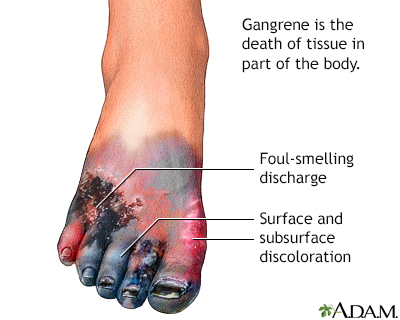Pregnancy SmartSiteTM
DefinitionGangrene is the death of tissue in part of the body. CausesGangrene happens when a body part loses its blood supply. This may happen from injury, an infection, or other causes. You have a higher risk for gangrene if you have:
SymptomsThe symptoms depend on the location and cause of the gangrene. If the skin is involved or the gangrene is close to the skin, the symptoms may include:
If the affected area is inside your body (such as gangrene of the gallbladder or gas gangrene), the symptoms may include:
Exams and TestsYour health care provider may diagnose gangrene from a physical exam. The following tests and procedures may also be used to diagnose gangrene:
TreatmentGangrene requires urgent evaluation and treatment. In general, dead tissue should be removed to allow healing of the surrounding living tissue and prevent further infection. Depending on the area that has the gangrene, the person's overall condition, and the cause of the gangrene, treatment may include:
Outlook (Prognosis)What to expect depends on:
The person may die if:
Possible ComplicationsComplications depend on:
Complications can include:
When to Contact a Medical ProfessionalContact your provider right away if:
PreventionGangrene may be prevented if it is treated before the tissue damage can't be reversed. Wounds should be treated properly and watched carefully for signs of infection (such as spreading redness, swelling, or drainage) or failure to heal. People with diabetes or blood vessel disease should routinely examine their feet for any signs of injury, infection, or change in skin color and seek care as needed. ReferencesBrownlee M, Aiello LP, Sun JK, et al. Complications of diabetes mellitus. In: Melmed S, Auchus RJ, Goldfine AB, Rosen CJ, Kopp PA, eds. Williams Textbook of Endocrinology. 15th ed. Philadelphia, PA: Elsevier; 2025:chap 38. Bury J, Griffin J. Responses to cellular injury. In: Cross SS, ed. Underwood's Pathology: A Clinical Approach. 8th ed. Philadelphia, PA: Elsevier; 2025:chap 5. Nicholson JA, Mansour MA. Gangrene of the foot. In: Cameron JL, Cameron AM, eds. Current Surgical Therapy. 14th ed. Philadelphia, PA: Elsevier; 2023:1148-1154. | |
| |
Review Date: 8/5/2025 Reviewed By: Jatin M. Vyas, MD, PhD, Roy and Diana Vagelos Professor in Medicine, Columbia University Vagelos College of Physicians and Surgeons, Division of Infectious Diseases, Department of Medicine, New York, NY. Also reviewed by David C. Dugdale, MD, Medical Director, Brenda Conaway, Editorial Director, and the A.D.A.M. Editorial team. The information provided herein should not be used during any medical emergency or for the diagnosis or treatment of any medical condition. A licensed medical professional should be consulted for diagnosis and treatment of any and all medical conditions. Links to other sites are provided for information only -- they do not constitute endorsements of those other sites. No warranty of any kind, either expressed or implied, is made as to the accuracy, reliability, timeliness, or correctness of any translations made by a third-party service of the information provided herein into any other language. © 1997- A.D.A.M., a business unit of Ebix, Inc. Any duplication or distribution of the information contained herein is strictly prohibited. | |

 Gangrene
Gangrene
